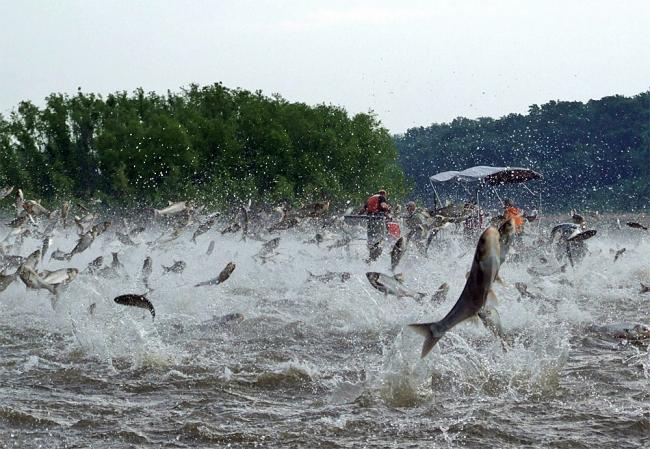Earth Watch Report - Biological Hazards
Image Source...
| Today | Biological Hazard | USA | MultiStates, [States of South Dakota and Nebraska] |
Biological Hazard in USA on Monday, 22 July, 2013 at 04:24 (04:24 AM) UTC.
| Description | |
| Wildlife
officials are trying to figure out what killed hundreds of Asian carp
in the Missouri River this spring. The answer to the mystery could help
protect other fish and might provide clues as to how to deal with the
invasive carp. Fisheries biologist Jeff Schuckman said no one has come
up with a good explanation for the fish kill yet, the Sioux City Journal
reported. The rotting carcasses of hundreds of silver carp were found
in the river's slow backwaters near Vermillion, South Dakota, and Ponca,
Nebraska Another incident was reported in Nebraska North Platte River
near where it joins the Missouri River. Both those fish kills were
reported in May. The unexplained deaths worry wildlife officials even
though the carp is an unwanted species that's competing for food with
native fish and growing fast. Silver, bighead and grass carp have all
been found in the Missouri River. "A lot of people think, 'Oh, it's just
Asian carp,' or, 'It's just common carp' that are dying, but that's a
big deal to us," said Schuckman, who works for the Nebraska Game and
Parks Commission. The number of Asian carp found in the Missouri River soared after the record flooding of 2011. Wildlife officials worry about the ravenous carp's ability to dominate an ecosystem. Silver carp also represent a safety hazard for boaters because they can hurl their bodies into the paths of boaters when startled. Officials don't think the carp that died near Vermillion, South Dakota, starved because they weren't thin. "What I observed was a single-species die-off, and that makes me think it was something else involved," Schuckman said. Disease may have caused the fish deaths, but officials weren't able to take any samples from this spring's fish kills. It's possible that whatever killed carp along the Missouri River this spring could help officials control the Asian carp population, but it's too soon to know that. And if disease killed the carp this spring, officials might still be reluctant to use that as a control measure because a disease could mutate and affect other species. | |
| Biohazard name: | Mass Die-off (Asian and silver carp) |
| Biohazard level: | 2/4 Medium |
| Biohazard desc.: | Bacteria and viruses that cause only mild disease to humans, or are difficult to contract via aerosol in a lab setting, such as hepatitis A, B, and C, influenza A, Lyme disease, salmonella, mumps, measles, scrapie, dengue fever, and HIV. "Routine diagnostic work with clinical specimens can be done safely at Biosafety Level 2, using Biosafety Level 2 practices and procedures. Research work (including co-cultivation, virus replication studies, or manipulations involving concentrated virus) can be done in a BSL-2 (P2) facility, using BSL-3 practices and procedures. Virus production activities, including virus concentrations, require a BSL-3 (P3) facility and use of BSL-3 practices and procedures", see Recommended Biosafety Levels for Infectious Agents. |
| Symptoms: | |
| Status: | confirmed |
Mystery Carp Killer
By: Associated Press Email
Posted: Mon 6:06 AM, Jul 22, 2013

The answer to the mystery could help protect other fish, and it might provide clues to dealing with the invasive carp.
Fisheries biologist Jeff Schuckman tells the Sioux City Journal reports that no one has come up with a good explanation for the fish kill.
Read More Here
...
...



No comments:
Post a Comment
Hello and thank you for visiting my blog. Please share your thoughts and leave a comment :)